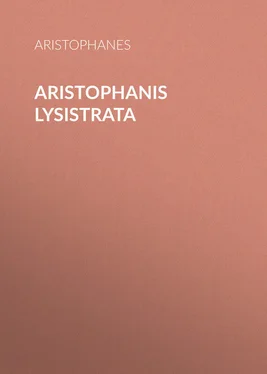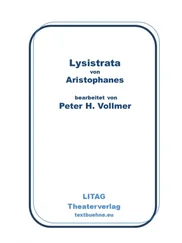Aristophanes - Aristophanis Lysistrata
Здесь есть возможность читать онлайн «Aristophanes - Aristophanis Lysistrata» — ознакомительный отрывок электронной книги совершенно бесплатно, а после прочтения отрывка купить полную версию. В некоторых случаях можно слушать аудио, скачать через торрент в формате fb2 и присутствует краткое содержание. Жанр: foreign_antique, foreign_prose, на латинском языке. Описание произведения, (предисловие) а так же отзывы посетителей доступны на портале библиотеки ЛибКат.
- Название:Aristophanis Lysistrata
- Автор:
- Жанр:
- Год:неизвестен
- ISBN:нет данных
- Рейтинг книги:3 / 5. Голосов: 1
-
Избранное:Добавить в избранное
- Отзывы:
-
Ваша оценка:
- 60
- 1
- 2
- 3
- 4
- 5
Aristophanis Lysistrata: краткое содержание, описание и аннотация
Предлагаем к чтению аннотацию, описание, краткое содержание или предисловие (зависит от того, что написал сам автор книги «Aristophanis Lysistrata»). Если вы не нашли необходимую информацию о книге — напишите в комментариях, мы постараемся отыскать её.
Aristophanis Lysistrata — читать онлайн ознакомительный отрывок
Ниже представлен текст книги, разбитый по страницам. Система сохранения места последней прочитанной страницы, позволяет с удобством читать онлайн бесплатно книгу «Aristophanis Lysistrata», без необходимости каждый раз заново искать на чём Вы остановились. Поставьте закладку, и сможете в любой момент перейти на страницу, на которой закончили чтение.
Интервал:
Закладка:
LYS. – Jam dicam. Sed priusquam dicam, vos hoc interrogabo pauxillum quidpiam.
MYRR. – Quidquid voles.
LYS. – Liberorum vestrorum patres nonne desideratis absentes in milita? Sat enim scio unicuique vostrûm peregre abesse virum.
CAL. – Meus quidem vir jam quinque menses, ô miser, abest in Thracia observans Eucratem. 17 17 An Athenian general strongly suspected of treachery; Aristophanes pretends his own soldiers have to see that he does not desert to the enemy.
LYS. – Meus vero totos sex menses ad Pylum. 18 18 A town and fortress on the west coast of Messenia, south-east part of Peloponnese, at the northern extremity of the bay of Sphacteria – the scene by the by of the modern naval battle of Navarino – in Lacedaemonian territory; it had been seized by the Athenian fleet, and was still in their possession at the date, 412 B.C., of the representation of the 'Lysistrata,' though two years later, in the twenty-second year of the War, it was recovered by Sparta.
LAMP. – Meus autem, si quando ab exercitu redeat, mox adnexo sibi clypeo evolat.
LYS. – Sed nec mœchi relicta est scintilla. Ex quo enim nos prodiderunt Milesii, ne olisbum quidem vidi octo digitos longum, qui nobis esset coriaceum auxilium. Velletisne ergo, si quam ego fabricam invenero, bello mecum finem imponere?
MYRR. – Per Deas juro me velle, si me oporteat vel encyclum hocce opponere pignori, sumtamque pecuniam hoc ipso die ebibere. 19 19 The Athenian women, rightly or wrongly, had the reputation of being over fond of wine. Aristophanes, here and elsewhere, makes many jests on this weakness of theirs.
CAL. – Ego vero mihi videor vel rhombi instar meipsam dissectura, et dimidium mei datura.
LAMP. – Ego vero vel ad Taygetum 20 20 The lofty range of hills overlooking Sparta from the west.
ascenderem, si ibi Pacem sim visura.
LYS. – Dicam ergo; siquidem res celanda non est. Nobis enim, ô mulieres, si volumus cogere viros ad colendam pacem, abstinendum est —
MYRR. – Quo? dic.
LYS. – Facietisne ergo?
MYRR. – Faciemus, si vel nos mori oporteat.
LYS. – Abstinendum igitur nobis est a pene. Quid mihi aversamini? quorsum itis? Vos inquam, cur labra distorquetis, et renuitis? cur color mutatur? cur lacrima fluit? facietisne, an non facietis? aut quid cogitatis?
MYRR. – Non fecerim, sed bellum serpat.
CAL. – Nec edepol ego, sed bellum serpat.
LYS. – Hoccine dicis tu, rhombe? atqui modo aiebas te vel dimidium tui abscissuram.
CAL. – Aliud, aliud quidquid voles. Vel per ignem, si oporteat, incedere volo. Hoc potius, quam quod de pene dicebas, ad quem nihil est quod compares, ô cara Lysistrata.
LYS. – Tu vero, quid?
LAMP. – Et ego volo per ignem.
LYS. – O libidinosum sexum omnem nostrum! non temere est, quod de nobis fiunt Tragœdiæ: nihil enim sumus, nisi Neptunus et scapha 21 21 In the original "we are nothing but Poseidon and a boat"; the allusion is to a play of Sophocles, now lost, but familiar to Aristophanes' audience, entitled 'Tyro,' in which the heroine, Tyro, appears with Poseidon, the sea-god, at the beginning of the tragedy, and at the close with the two boys she had had by him, whom she exposes in an open boat.
. Sed, ô cara Lacæna (tu enim si fueris sola mecum, perditam 22 22 Typo in Oxford: "perpitam". Leipzig has "perditam".
rem adhuc restituere poterimus) adsentire mihi.
LAMP. – Per ecastor 23 23 "By the two goddesses," – a woman's oath, which recurs constantly in this play; the two goddesses are always Demeter and Proserpine.
difficile est feminas dormire solas sine mentula. Hoc tamen perpeti oportet: nam pacem fieri oportet maxime.
LYS. – O carissima et sola harum femina.
MYRR. – Si autem, quod absit, quam maxime abstineamus a quo tu dicis, magisne eapropter fiet pax?
LYS. – Multo magis, ita me ament Divæ. Si enim domi sederemus pigmentis oblitæ et in amorginis 24 24 One of the Cyclades, between Naxos and Cos, celebrated, like the latter, for its manufacture of fine, almost transparent silks, worn in Greece, and later at Rome, by women of loose character.
subucilis nudæ insederemus glabro cunno, arrigerent viri, et coire cuperent: nos autem si non accederemus, at nos contineremus, sat scio mox pacem eos facturos.
LAMP. – Sane Menelaus olim conspectis, ut puto, Helenæ nudis papillis, ensem abjecit.
MYRR. – Quid vero, ô misella, si nos omiserint viri?
LYS. – Tum istud Pherecratis adhibe, Canem excoriatum excoriare . 25 25 The proverb, quoted by Pherecrates, is properly spoken of those who go out of their way to do a thing already done – "to kill a dead horse," but here apparently is twisted by Aristophanes into an allusion to the leathern 'godemiche' mentioned a little above; if the worst comes to the worst, we must use artificial means. Pherecrates was a comic playwright, a contemporary of Aristophanes.
MYRR. – Nugæ sunt ista simulacra. Si vero comprehensas in cubiculum vi traxerint nos?
LYS. – Renitere apprehensis foribus.
MYRR. – At si verberent?
LYS. – Tum præbe, sed maligne. Nulla enim his inest voluptas, si per vim fiant. Aliisque modis molestia eos afficere oportet. Nec dubites, quin ocius defatigentur: nunquam enim ex eo voluptatem vir capiet, ni mulieri simul jucundum sit.
MYRR. – Si vobis hoc videtur, nobis itidem videtur.
LAMP. – Et nos quidem nostris viris persuadebimus, ut ubique sine dolo malo pacem colant. Sed Atheniensium colluviem quomodo quis adducere possit, ut ne rursus delicias faciat?
LYS. – Ne sis sollicita: nos, quod in nobis erit, nostratibus persuadebimus.
LAMP. – Nequicquam, quamdiu in triremes conferentur studia, et in Divæ æde adservabitur immensa illa pecuniæ vis.
LYS. – Sed et hoc etiam bene provisum et præcautum est: occupabimus enim arcem hodie. Nam provectioribus ætate mulieribus hoc mandatum est negotium, ut, dum nos hæc constituimus, sub specie sacrificandi occupent arcem.
LAMP. – Omnino fieri possit: etenim sic bene autumas.
LYS. – Cur ergo non hæc quamprimum, ô Lampito, jurejurando confirmamus, ut irrupta sint?
LAMP. – Jusjurandum modo concipito, ut juremus.
LYS. – Recte autumas. Ubi est Scythæna? 26 26 Literally "our Scythian woman." At Athens, policemen and ushers in the courts were generally Scythians; so the revolting women must have their Scythian "Usheress" too.
quo spectas? Pone in conspectu clypeum supinum: et mihi det hostias aliquis.
MYRR. – Lysistrata, quo sacramento nos adstringes?
LYS. – Quonam? In clypeum, ut Æschylum aiunt fecisse quondam, ove mactata — 27 27 In allusion to the oath which the seven allied champions before Thebes take upon a buckler, in Aeschylus' tragedy of 'The Seven against Thebes,' v. 42.
MYRR. – Ne, quæso, mea Lysistrata, juraveris in clypeum quicquam super pace.
LYS. – Quodnam erit ergo jusjurandum?
MYRR. – Si sumtum alicunde album equum immolemus, et super eo juremus.
LYS. – Quorsum album equum?
MYRR. – Sed quomodo jurabimus nos?
LYS. – Edepol tibi dicam, si velis. Collocato supino grandi calice nigro, in eum immolemus Thasii 28 28 A volcanic island in the northern part of the Aegaean, celebrated for its vineyards.
vini urceum, et juremus aquam 29 29 Leipzig: "et iuremus in calicem nos non infusuras."
in calicem nos non infusuras.
Интервал:
Закладка:
Похожие книги на «Aristophanis Lysistrata»
Представляем Вашему вниманию похожие книги на «Aristophanis Lysistrata» списком для выбора. Мы отобрали схожую по названию и смыслу литературу в надежде предоставить читателям больше вариантов отыскать новые, интересные, ещё непрочитанные произведения.
Обсуждение, отзывы о книге «Aristophanis Lysistrata» и просто собственные мнения читателей. Оставьте ваши комментарии, напишите, что Вы думаете о произведении, его смысле или главных героях. Укажите что конкретно понравилось, а что нет, и почему Вы так считаете.











